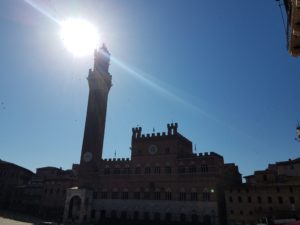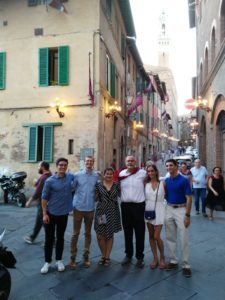
Last Tuesday was Il Palio, the biannual horse race and festival that takes place on the main square Piazza del Campo. Although the race itself was fun, the best part was the lead-up to it. This week in my cultural class, we focused on the cultural significance of both the Palio and the Contrade, or neighborhoods, that compete in the race. I learned that both of these are much more than they appear on the surface. From the mutually sustaining relationship that the Palio and Contrade have, to the intriguing and complex strategy and bribery that goes on in the race itself, the system is at the very basis of Sienese culture.
What I’ve found most interesting about the system is the deep connection that people feel with it, even though it really doesn’t matter in any way other than symbolically. The winning Contrada, for example, doesn’t get any reward other than a banner. The Contrade themselves, in fact, are very similar to each other in terms of organization and activities. The only difference between them being the artificial boundaries. Still, rivalries between Contrade exist that are so heated that “mixed” couples have to live in separate houses during the 4 days of the event. Altogether, the allegiance to Contrade and importance of the Palio rises to a level beyond even the most intense professional sports rivals. Interestingly, though, this rivalry only exists during the Palio (and maybe during the few weeks leading up to it.) For most of the year, the rivalries don’t really exist.
Last Saturday my Neapolitan roommate, Michele, invited me to go with him to the first Prova, or trial, of the horses after they had been selected and assigned to the Contrade. Having watched the pre-selection runs of the horses and the assignment lottery with my Notre Dame friends, I was excited to get the perspective of a non-Sienese Italian on the Palio. Although he has lived here for a year and a half, he didn’t grow up with the Contrada system. The differences between how he and my cultural class instructor (who is a prominent member of the Torre Contrada) view the Palio is striking. While Michele was quite knowledgeable about the details of the horses and jockeys, he seemed to view the race as just a sporting event, a view that any “real” Sienese would disparage.
On Monday night we had the opportunity to go to the Contrada dinner for Torre, which is a massive event where about two-thousand people dine on the street. The cooks and servers are all volunteers from the Contrada. I ended up sitting by some people from Rimini, who had family in Siena. We talked a lot about sports, especially basketball and baseball. I feel like I’m making a lot of progress with my Italian, especially after talking so much with Italians during the Palio events.